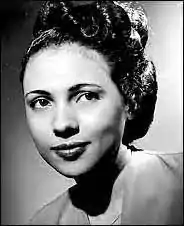Dorothy Van Engle | |
|---|---|
 | |
| Born | Donessa Dorothy Van Engle August 14, 1910 Harlem, New York, US |
| Died | May 10, 2004 (aged 93) Ocala, Florida, US |
| Other names | Donessa Dorothy Hollon |
| Occupations |
|
| Years active | 1932–1939 |
| Employer | Oscar Micheaux |
| Known for | Starring in Murder in Harlem and Swing! |
| Spouse | Herbert Hollon |
| Children | 2 |
Dorothy Van Engle (August 14, 1910 – May 10, 2004) was an American actress who performed throughout the 1930s. She starred in Oscar Micheaux films, including Murder in Harlem and Swing!.[1]
History
Early life
Born Donessa Dorothy Van Engle in Harlem, New York, on August 14, 1910,[2] she grew up with her mother and stepfather, being influenced by the latter's band and show business activities. It was through these acquaintances that she first met Oscar Micheaux and began starring in his films. Before that point, she had been working as a model and it was through these jobs that she made money, as Micheaux's low budget films never had the money to properly pay the actors. But, in her own words, she stated that she acted for fun and enjoyed the "adventure" such roles gave her. Also working as a seamstress, she made her own costumes for her film roles.[1]
Film career
Cast as the main female lead in the 1935 film Murder in Harlem, Engle acted as a strong female character who actually solved the private eye's cases rather than the male lead.[1] The film's subject matter and original source events were criticized, however, along with Engle and the other actress's acting in the film, as if their lines were being delivered with an "air of artificiality".[3] In 1938's Swing!, she played the role of an assistant producer to the black male lead who played a producer character and it was her role that was responsible for making the critical show idea that allowed the male lead to be successful in the film. Ohio State University's professor of film studies, J. Ronald Green, described her as one of the few primary women actors cast by Micheaux and she frequently played intelligent and strong-minded characters that acted as a "proto-feminist role" for women at the time.[1] Green further stated that it was these race films that were the sole source of positive representation of black Americans in media during the early half of the 20th century.[1]
Personal life
She married Herbert Hollon and left her acting career behind to start a family as Donessa Dorothy Hollon. She had two sons and several grandchildren.[4] She lived with her husband, a building superintendent, in New York and New Jersey before moving to Florida in 1978.[1] She lived in Port Charlotte and worked at a library after her husband's death in 1992. She spent her final months in Ocala and died at the age of 93.[4]
Filmography
- The Girl from Chicago (1932)[4]
- Harlem After Midnight (1934)[1]
- Murder in Harlem (1935)[5]
- Temptation (1935)[4]
- Swing! (1938) as Lena Powell[1]
- God's Step Children (1938) as Naomi's mother (uncredited)[2]
- Lying Lips (1939)[4]
References
- 1 2 3 4 5 6 7 8 Mclellan, Dennis (May 14, 2004). "Dorothy Van Engle, 87; African American Star of 'Race Films' in '30s". Los Angeles Times. Retrieved April 23, 2022.
- 1 2 Boyd, Herb (August 23, 2018). "Dorothy Van Engle, a gorgeous and talented actress". New York Amsterdam News. Retrieved April 23, 2022.
- ↑ Bernstein, Matthew (2009). Screening a Lynching: The Leo Frank Case on Film and Television. University of Georgia Press. p. 58. ISBN 978-0-8203-2752-5.
- 1 2 3 4 5 Lloyd, Christopher (May 12, 2004). "Black film star Dorothy Van Engle dies at 93". Star–Banner. Archived from the original on June 6, 2022. Retrieved April 23, 2022.
- ↑ "Stirring Scenes From "Lem Hawkins' Confession," New Micheaux Film Production". The Pittsburgh Courier. April 27, 1935. Retrieved April 23, 2022.
Further reading
- Gates, Henry Louis; Higginbotham, Evelyn Brooks (2008). The African American National Biography: Uggams-Zuber. Oxford University Press. pp. 10–11. ISBN 978-0-19-516019-2.
- McCann, Bob (2010). Encyclopedia of African American Actresses in Film and Television. McFarland & Company. pp. 340–341. ISBN 978-0-7864-3790-0.